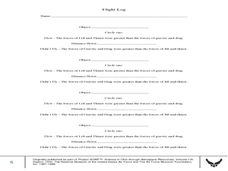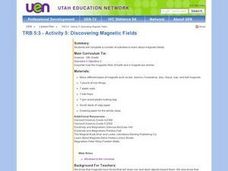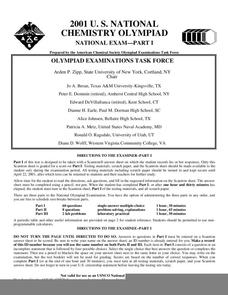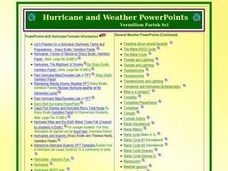Curated OER
Can You Bear It? Pulleys, Gears, Forces, Structures and Mechanisms
Students review the types of simple machines. As a class, they focus on the positives and negatives of pulleys and gears and identify what pulleys and gears change of an object. They work together to design their own object to support a...
Curated OER
Forces in Earth
In this Earth's forces worksheet, students will review the characteristics of earthquakes, including types of faults. Students will interpret a seismograph read-out from an earthquake. Students will complete 10 fill in the blank...
Curated OER
Types of Government
In this government worksheet, 3rd graders read a selection about different types of governments and complete 7 matching, 3 fill in the blanks and 3 true / false questions.
Curated OER
Types of Scientists
In this science worksheet, middle schoolers match each type of scientist listed in the left-had column to its correct description found in the right-hand column. There are 34 different scientists to match on the sheet.
Curated OER
World's Most Dynamic Force
Students explore the Earth's forces. They review an assessment task and its accompanying rubric. They classify ten items as long-term or short-term interactions of the Earth's components and rank the destructive impact of the forces. ...
LABScI
Potential and Kinetic Energy: The Roller Coaster Lab
Ron Toomer, a famous roller coaster designer, suffered from motion sickness. Pupils design their own roller coasters, learning about potential and kinetic energy in the process. Labs focus on the importance of drop height, energy...
It's About Time
Concentrating on Collisions
How important is momentum? Pupils investigate and apply the definition of momentum as they conduct analyses during a series of one-dimensional collisions. They infer the relative masses of two objects by carefully staging and predicting...
Columbus City Schools
It’s Electric!
Shocking! Who knew so many great ideas existed for teaching middle schoolers about electricity? Find them all within this energetic framework. You'll light up at the variety of printable and web-based resources within! After building...
CK-12 Foundation
Loop-the-Loop
What prevents a roller coaster from falling when it goes upside down? Scholars experiment with a roller coaster simulation controlling the mass of the coaster, the height of the hill, and the radius of the loop. They learn which factors...
Curated OER
Household Things that Fly and Why!!!
Students examine the four forces of flight. In this flight lesson, students test to see which types of items will fly. Students make predictions on whether the item will fly or not. Students gain knowledge about lift, gravity, thrust and...
Curated OER
First Class Lever Lab
In this first class lever learning exercise, students investigate the mechanical advantage of this simple machine. Kids change the effort arm and the resistance arm and calculate the resistance force, effort force and the...
Curated OER
Design Your Own Rube Goldberg Machine
Students participate in a culminating activity for a unit on Energy and Simple Machines. They are challenged to incorporate simple machines in to a complex mechanical system. While designing and testing their machine they will also...
Curated OER
Discovering Magnetic Fields
Fifth graders examine the different types of magnets (bar, horseshoe, disc, ball, etc.) and experiment with the magnets and iron filings to discover the magnetic fields of each type of magnet.
Curated OER
Friction Force
High schoolers investigate friction force on a variety of objects such as bricks and cardboard boxes. They use a force probe to collect data on the changes in force required to drag the objects across a variety of surface types.
Curated OER
2008 U.S. National Chemistry Olympiad Part III
In this chemistry olympiad lab worksheet, chemists are required to design two experiments. In one, they design an experiment to identify seven solutions given to them in pipettes. In the other, they design an experiment to determine the...
Curated OER
Forces And Energy
Young scholars investigate the atom and how it is formed. They conduct research using a variety of resources and then construct a model of the atom. Then students have class discussion. The instructional activity includes background...
Hawaiʻi State Department of Education
Machines
What do science and dance have in common? Simple machines, work, and force! First, children discuss machines, wheels, inclined planes, and wedges. They create inclined planes with their bodies and make up dances about wheels and wedges....
Curated OER
2001 U.S. National Chemistry Olympiad Part I
Sixty multiple-choice questions test on a variety of first year chemistry subjects. In order to succeed, exam takers must be competent with properties of elements, stoichiometry problems, gas laws, bond dissociation, and types of...
NASA
Erosion and Landslides
A professional-quality PowerPoint, which includes links to footage of actual landslides in action, opens this moving instructional activity. Viewers learn what conditions lead to erosion and land giving way. They simulate landslides with...
Curated OER
May the Force Be With(in) You
Learners explore the characterization of heroes and their representation of the values and beliefs of the society in which they are created. They first examine the creation of the 'Star Wars' heroes and plots, and then develop their own...
Curated OER
Circulatory Systems
Excellent diagrams, labels and summaries make this resource be valuable to your students throughout the topic of circulation. All types of circulation vessels are explained, their structure and function is detailed, and the overall...
Curated OER
Hurricane and Weather Power Points
Providing a wealth of information about hurricanes, tornadoes, and other types of weather-related events, this resource could be used in the classroom in a variety of ways. A teacher could use the PowerPoints listed as a way to introduce...
Curated OER
Welcome to the Wonderful World of Machines
Designed for a lower elementary school classroom, this presentation on simple machines is a wonderful way to introduce this topic. The resource begins by identifying and defining the six types of simple machines, and then goes on to...
Centers for Ocean Sciences
Ocean and Great Lakes Literacy: Principle 1
Is your current lesson plan for salt and freshwater literacy leaving you high and dry? If so, dive into part one of a seven-part series that explores the physical features of Earth's salt and freshwater sources. Junior hydrologists...























